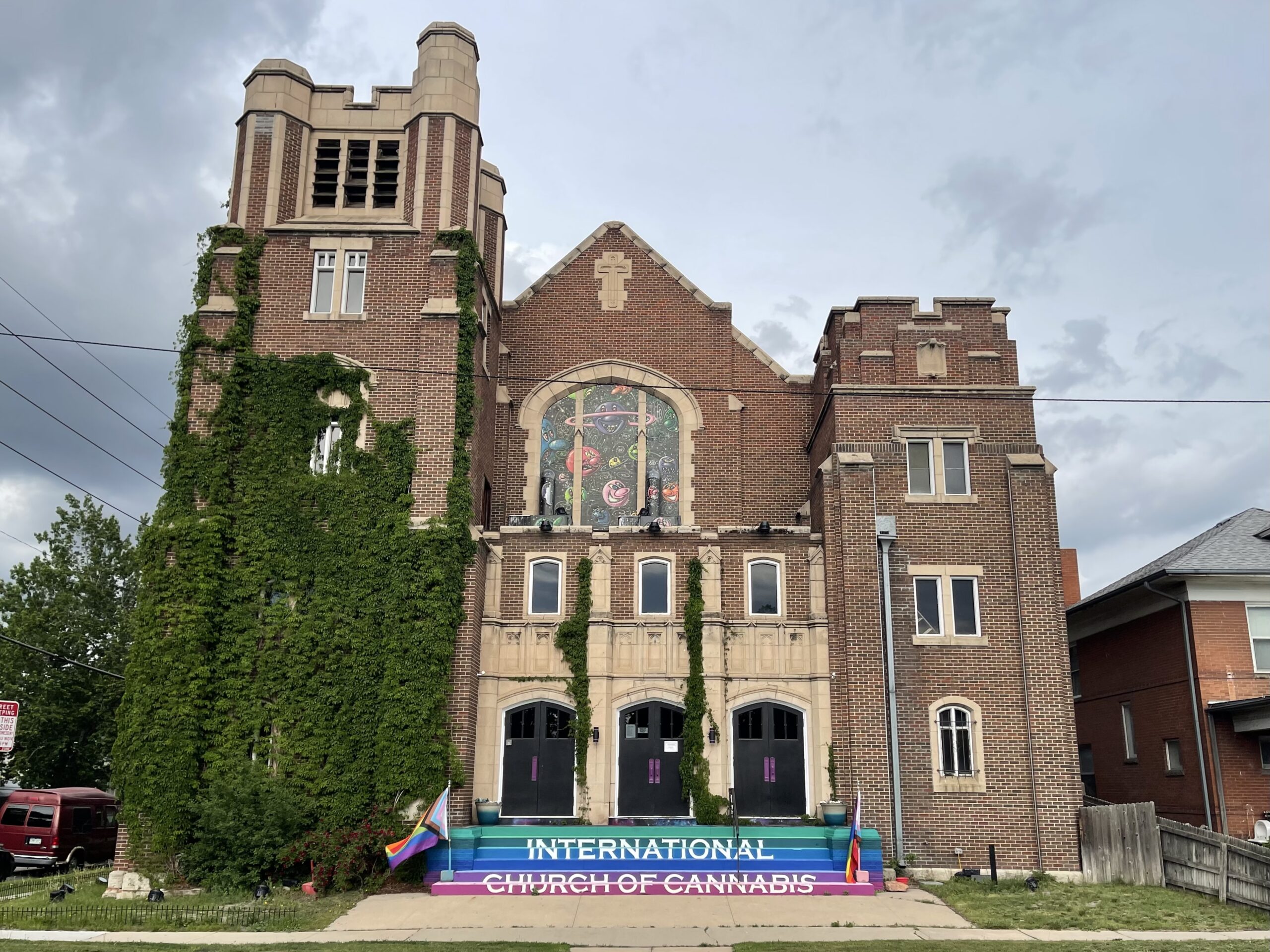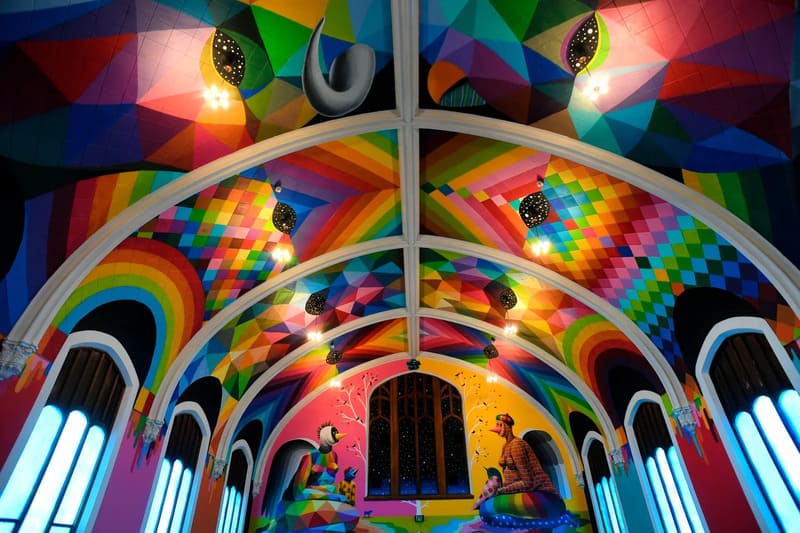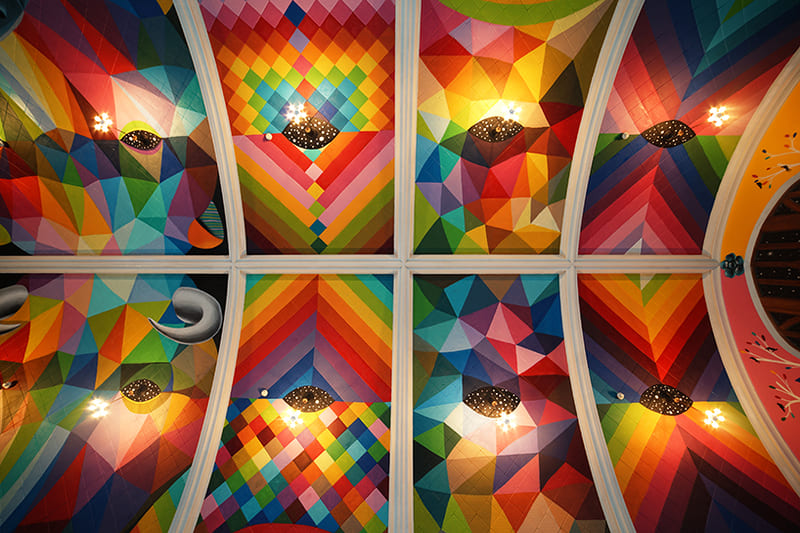In a quiet Denver neighborhood, a historic Lutheran church has been transformed into a vibrant and unconventional spiritual home, attracting attention from around the world. This is the International Church of Cannabis, a place where spirituality, community, and the cannabis plant intersect in a truly unique way.
The International Church of Cannabis in Denver, Colorado, is a spiritual organization that uses cannabis as a sacrament to facilitate personal spiritual journeys and deepen self-awareness. Housed in a historic church building famous for its psychedelic interior murals, it serves as a community hub for its members, known as Elevationists, who do not worship cannabis itself but use it to elevate their consciousness.

This unique institution challenges traditional notions of religion and offers a fascinating look at the evolving cultural and spiritual landscape surrounding cannabis in a post-legalization world. It’s more than just a place to consume cannabis; it’s a community built on a shared philosophy of self-discovery and creative expression.
What is the International Church of Cannabis?
The International Church of Cannabis is not a typical church. There is no specific deity or dogmatic text. Instead, it is a philosophical organization that has adopted the structure and community aspects of a church to provide a safe, legal space for its members to explore their spirituality with the aid of cannabis.
The International Church of Cannabis is a Denver-based religious nonprofit organization for "Elevationists," individuals who use the cannabis flower as a sacrament. Members believe that cannabis can help accelerate and deepen a personal spiritual journey, leading to a more authentic version of oneself. The church itself does not sell or supply cannabis.

The church officially opened its doors on April 20, 2017, quickly gaining international fame for its mission and, most notably, its breathtaking interior artwork.
Key Aspects of the Church:
- The Philosophy of Elevationism: The core belief system is called Elevationism. It has no divine author or specific dogma. The central tenet is that an individual’s spiritual journey is one of self-discovery, and that the ritual use of cannabis can be a catalyst for this journey. The goal is to elevate one’s mind to achieve a better, more honest version of oneself.
- Cannabis as a Sacrament: For Elevationists, cannabis is a sacred flower. It is used ritually to heighten awareness, deepen introspection, and foster a sense of connection and creativity. It is important to note that the church does not worship cannabis; rather, it is used as a tool or sacrament, similar to how some other religions might use wine or peyote.
- Community and Inclusivity: The church is open to people of all faiths and backgrounds. It aims to be a welcoming and non-judgmental community where individuals can gather, connect, and explore their spirituality without fear of persecution.
- Legal Status: The church operates as a registered religious nonprofit organization. Its use of cannabis as a sacrament is based on principles of religious freedom. However, it strictly adheres to Colorado state law: all members must be 21 years of age or older, and no cannabis is sold or distributed on the premises. Members bring their own cannabis for consumption during services.
The Art and Architecture: A Psychedelic Sanctuary
Perhaps the most famous feature of the International Church of Cannabis is its building. The structure itself is a historic landmark, a former Lutheran church built in the early 1900s. While the exterior retains its traditional brick architecture, the interior is a jaw-dropping explosion of color and light.
The interior of the International Church of Cannabis was transformed by renowned artist Okuda San Miguel, with contributions from artist Kenny Scharf. The chapel’s vaulted ceiling and walls are covered in vibrant, psychedelic murals featuring geometric patterns, bold colors, and fantastical figures, creating an immersive and awe-inspiring visual experience designed to enhance the spiritual journey of its members.

The art is not merely decorative; it’s integral to the church’s purpose.
- The Artist: Spanish artist Okuda San Miguel is famous for his distinctive style of colorful, geometric structures and patterns that often adorn streets, buildings, and galleries worldwide. His work on the church is one of his most celebrated large-scale projects.
- The Experience: The murals create a 360-degree visual spectacle. When members gather for services, the combination of the art, music, and the ritual use of cannabis is intended to create a multi-sensory experience that encourages introspection, creativity, and a sense of wonder.
- "Beyond" Light Show & Guided Meditation: For the public, the church offers ticketed events called "Beyond." These are immersive experiences featuring a guided meditation, music, and a stunning laser light show that interacts with the murals, bringing the artwork to life. These events are non-consumption and open to all ages, serving as a major source of funding for the church’s upkeep.
Services and Community Activities
While the consumption of cannabis during services is a key aspect for members, the church’s activities extend beyond this ritual. It functions as a genuine community hub.
Services at the International Church of Cannabis are for members only and involve the ritual use of cannabis, accompanied by music, guest speakers, artists, comedians, and discussions aimed at fostering personal growth and community connection. The church also hosts public events, community outreach programs, and serves as a venue for weddings and private functions.
The church aims to provide more than just a space for consumption; it aims to build a supportive community.
- Member Services: These are private events where members (Elevationists) can legally consume cannabis in a communal, spiritual setting. The format can vary but often includes elements of a traditional service (music, a speaker) combined with a relaxed, communal atmosphere.
- Public Offerings:
- Public Hours: The church is often open to the public during specific hours for people to come in, view the incredible artwork, and learn about the organization (no cannabis consumption during these times).
- "Beyond" Light Show: The ticketed light show and meditation is their primary public-facing event.
- Community Events: The church has hosted movie nights, comedy shows, art events, and educational talks.
- Volunteerism & Outreach: The organization and its members engage in volunteer activities and community service projects in the Denver area.
- Private Events: The stunning and unique venue is also available for rent for private events, including weddings, commitment ceremonies, and corporate functions.
Controversy and Legal Standing
The existence of a church centered around the use of cannabis as a sacrament has naturally generated both curiosity and controversy, placing it at the intersection of religious freedom, drug policy, and public perception.
The International Church of Cannabis has faced legal and public scrutiny since its inception. It defends its practices under the protection of religious freedom, similar to how other religions use sacramental wine or peyote. While it operates within the bounds of Colorado’s cannabis laws (21+, no sales), its model continues to test the boundaries and definitions of what constitutes a legitimate religious practice in the eyes of the law and the public.
The church’s legal foundation is a key part of its story.
- Religious Freedom Argument: The church’s legal standing is based on the First Amendment of the U.S. Constitution (protecting freedom of religion) and related acts like the Religious Freedom Restoration Act (RFRA). They argue that for Elevationists, the consumption of cannabis is a sincere and central part of their spiritual practice.
- Adherence to State Law: The church is very strict about following Colorado’s state and local laws regarding cannabis. No one under 21 is permitted at consumption services, and absolutely no cannabis is bought, sold, or traded on church property. Members must bring their own.
- Public Perception: The church has faced skepticism from some who view it as merely an excuse to create a "cannabis club" or a novelty. However, its founders and members maintain that their spiritual beliefs are sincere and that the community provides genuine support and a sense of belonging.
- Ongoing Dialogue: The church continues to be a focal point in the ongoing national and global conversation about cannabis legalization, its cultural acceptance, and its potential role beyond purely recreational or medicinal use.
Conclusion
The International Church of Cannabis is far more than just a "pot church." It is a bold experiment in modern spirituality, a vibrant community hub, and a stunning work of art. By combining the ancient practice of using a plant sacrament with a contemporary, non-dogmatic philosophy, it challenges visitors and members alike to "rethink" the nature of church, community, and the pursuit of a personal spiritual path. Whether viewed as a pioneering spiritual movement, a test case for religious freedom, or simply a breathtaking art installation, its unique presence in Denver has undeniably created a colorful and thought-provoking landmark.







